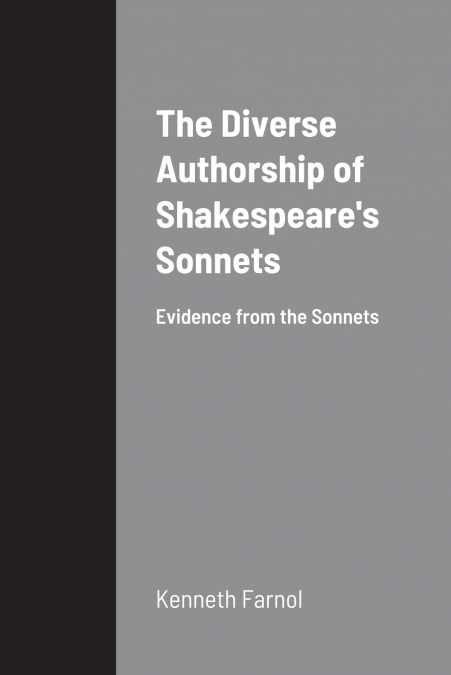
Kenneth Farnol
It is proposed that William Shakespeare did not write all of the sonnets bearing his name. This strictly independent publication compares and discusses all 154 ’Shakespeare’s’ Sonnets with some remarkable findings. There are many valid reasons to question the authorship of ’Shakespeare’s’ Sonnets. They are clearly Satirical, Aristocratic or Political and were self-evidently never intended for illicit publication in 1609. This impartial book does not depend on unconvincing folklore or ’theories’ but relies on evidence from the Sonnets themselves. William Shakespeare indeed wrote some of the Sonnets bearing his name. Many, by style and content, were more likely to have been written by the eminent Sidney/Herbert/Wroth family together with other unknown authors. Who has never wondered about the first-person authorship of ’maternal’ Sonnet Nos. 1-17? Were these intimate family Sonnets really ’commissioned’ to be written by a busy playwright when they are plainly in the ’sweet’ metaphysical style of the distinguished poet Mary Sidney Herbert, Countess of Pembroke? Then, who can deny that long-overlooked Mary (Sidney) ’Wroth/Worth’ puns and insensitive metaphors in Sonnet Nos. 80 and 83 were probably written by her ’Fair Youth’ cousin/lover William Herbert, Earl of Pembroke (who clearly ’owned’ the Sonnets) on the occasion of her arranged-marriage in 1604? Subject to recent scholarship and freedom from an exclusively ’Shakespeare’ mindset: this long-overdue investigation encourages open-minded readers to reread the Sonnets at simple face-value and draw their own conclusions...